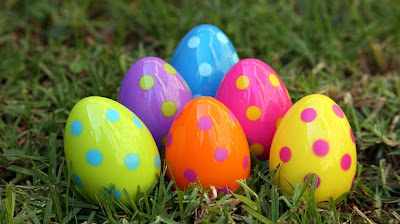 http://blog.jumpitz.com/wp-content/uploads/2009/03/happyeaster.png
http://blog.jumpitz.com/wp-content/uploads/2009/03/happyeaster.pngEaster is the celebration of Jesus Christ's rising from the dead (His Resurrection) after His crucifixion which took place on what we now term Good Friday.
Easter is usually celebrated on the first Sunday after the full moon following the Vernal or Spring Equinox on March 21st. This can be any Sunday between March 22nd and April 25th. It is the most sacred of all the Christian holidays or celebrations.
Christ's return (or rising) from death is called the Resurrection. According to the scriptures, Christ's tomb was empty three days after His death, which is commemorated on Good Friday. His followers saw Him and talked to Him after this. Christians therefore believe that they have the hope of a new life (an everlasting life in Heaven) after their earthly death.
The Holy week is the last week of Lent. It begins with the observance of Palm Sunday, the Sunday before Easter Sunday. The name, Palm Sunday originated from Jesus's entry in Jerusalem. The crowd laid carpets of palms on the street for Him. The Last Supper is commemorated on Holy Thursday of special week (often called Maundy Thursday) and Friday is the anniversary of the crucifixion of Jesus Christ on the cross. The Lenten season and Holy week end with Easter Sunday (the Resurrection of Jesus Christ).
HOW DID EASTER GET ITS NAME ?
The English name "Easter" is much newer. Before Christianity in early England, the people celebrated the vernal equinox with a feast honoring Eostre, the Pagan goddess of spring. When the early English Christians wanted others to accept Christianity, they decided to use the name Easter for this holiday so that it would match the name of the old spring celebration. This made it more comfortable for other people to accept Christianity. Some believed that the word Easter came from an early German word "eostarun", meaning dawn and white. Newly baptized Christians wore white clothes as a sign of their new life on Easter.
NAMES OF EASTER
Easter was called Pesach by early Christians. It is the Hebrew name for Passover. Today, the name for Easter in many cultures in Europe are similar to the word Pesah. For example :
France -Paques /Spain -Pascua /Italy -Pasqua /Albania -Pashke/ Greece -Pascha /Norway -Paaske /Holland -Pasen /Sweden -Pask
EASTER EGG
As Christianity spread, more familiar traditions, symbols and celebrations of spring were associated with Easter . One of the oldest spring symbols in the world is the egg. The oval shape of the egg was the same shape for a raindrop and a seed. These two were important life-giving elements. The egg itself promises new life as in spring, birds, and many other animals are hatched from eggs. In fact, the Persians, Hindus and Egyptians believed that the world began with a single egg. In ancient China, Rome and Greece, eggs were given as springtime gifts. In Polland and Russia, hours are spent on drawing intricate designs on Easter eggs. In England, members of the royal families gave each other gold-covered eggs as Easter gifts in the middle ages. The most famous Easter egg decorator was Peter Carl Faberge. He designed eggs from gold, silver and other precious gems for kings of Europe and czars of Russia. These eggs are priceless now and can only be found in museums and private collections. In early America, children decorated their eggs by using dyes made from natural materials like fruit and leave coloring.






